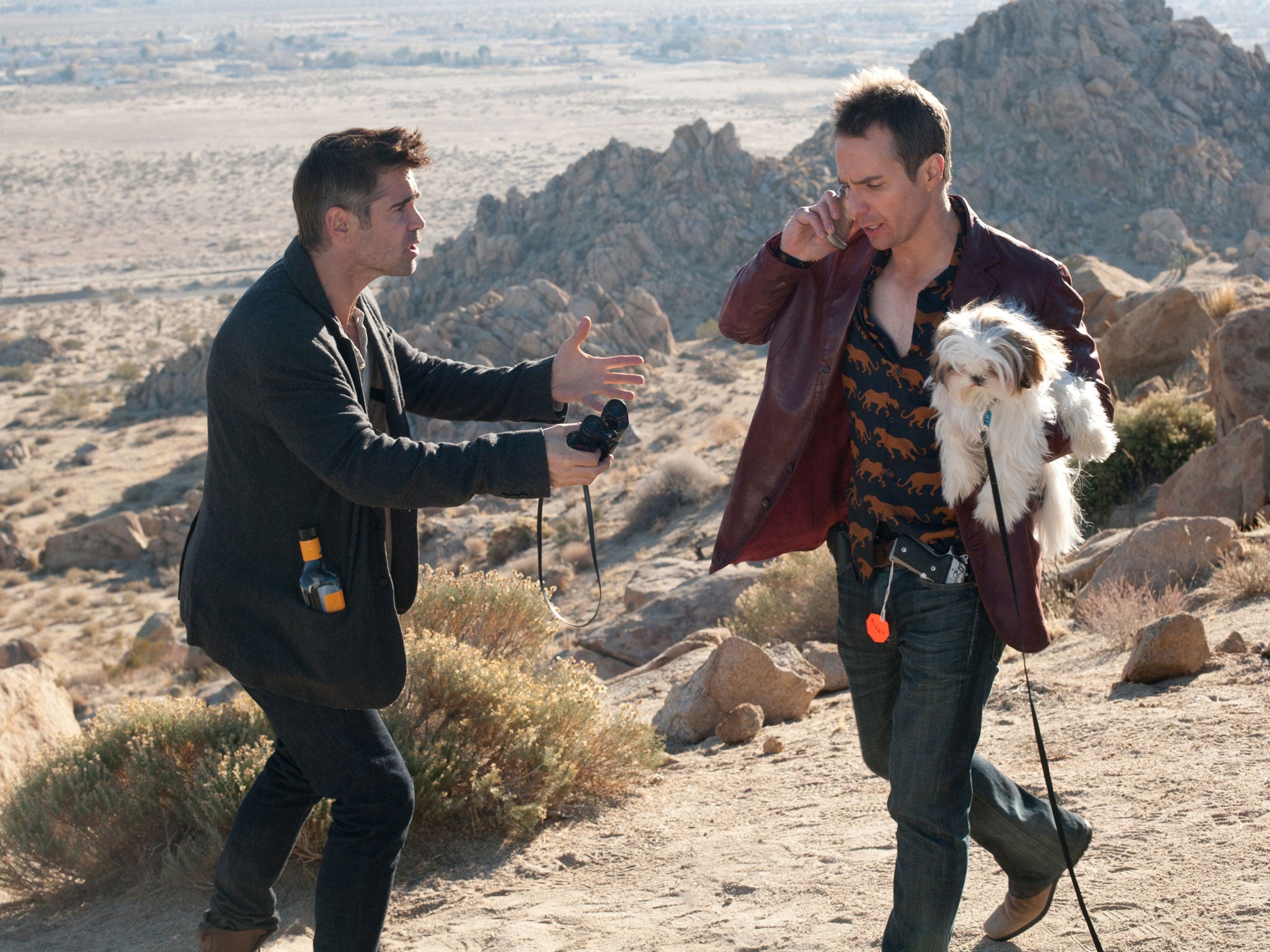Movie review: Seven Psychopaths, Lurid pulp metafiction with a sly touch of the Tarantinos
(15)

From Barton Fink going mad in a hotel room to William Holden face down in a swimming pool in Sunset Boulevard, we’ve had plenty of films about the misadventures of screenwriters in Hollywood. Playwright turned film-maker Martin McDonagh’s second feature after In Bruges isn’t exactly original. It’s a self-reflexive affair about a hard-drinking writer (Colin Farrell) who can’t finish a script – a plight one guesses McDonagh himself must have been suffering from when he started work on it. As he struggles for inspiration, Marty is caught up in the middle of a real-life, shaggy-dog kidnapping story.
Seven Psychopaths is far-fetched, relentlessly superficial and luridly violent. It is also very funny, indeed. McDonagh has a flair both for deadpan, absurdist humour and for slapstick. His actors enjoy themselves, too. The much-maligned Farrell may sometimes struggle in dramatic roles but he excels in the kind of comedies McDonagh writes. Here, he retains a boyish naiveté even as the most bloodcurdling and outlandish events occur around him.
As in Quentin Tarantino’s films, wisecracking dialogue is combined with often very vicious scenes of torture and killing. The violence is intended to be cartoonish and tongue in cheek but it’s the nature of live action film that it seems realistic. There is a sadistic element here that will alienate some audiences. One scene in particular grates. We see hardbitten gangster Charlie (Woody Harrelson) threatening his terrified dog walker Sharice (Gabourey Sibide) because she has allowed his beloved Shih Tzu to be kidnapped. Of course, it’s a preposterous and comic premise – the ruthless gangland boss who drools over his pet pug. The title itself tells us that this is not a story about peaceable, well- balanced types. Sharice’s terror, though, seems painfully real. McDonagh delights in showing her discomfiture. At such moments, the film takes on a repellent quality.
Thankfully, such moments are rare. Given the high body count, the tone of the film is surprisingly good- natured. It helps that McDonagh has recruited such distinctive actors. Tom Waits (as a serial killer of serial killers) and Harry Dean Stanton (a quaker psychopath) feature in cameos, Christopher Walken has a much more substantial role and gives the film what little emotional depth it has as the Gandhi-quoting leader of the dog kidnapping ring. Strangely dapper but with a Bela Lugosi-like pallor, he intones his lines in that lilting monotone familiar from his earlier gangster movies like King of New York. He is an intriguing combination of petty crook and peyote-taking visionary. In his scenes with his cancer-ridden wife, he shows an unlikely tenderness. His uncanny calm contrasts with the manic behaviour of Marty’s best friend Billy (Sam Rockwell), who behaves with the grinning inanity of a children’s TV presenter but turns out to be more deranged than anyone else.
Like Alex Cox’s Repo Man, this is determinedly oddball film-making. In most thrillers, the protagonists are taciturn, alpha male types. Here, they are neurotics who can’t stop talking. McDonagh is scattershot in his references, throwing in moments that are evocative of old Sam Peckinpah Westerns as well as motifs you might expect to find in low-grade Michael Winner vigilante thrillers. Locations range from LA suburbia to majestic desert landscapes. The writer-director strives to have it both ways – to send up cheesy exploitation pics even as he is celebrating them. There is a tension between the action and the ironic dialogue that undercuts it. The sexual politics are on the neanderthal side. Women characters are there to be cursed at, ogled or shot. Marty is hen-pecked by his girlfriend (Abbie Cornish). Olga Kurylenko’s brief role as Harrelson’s two-timing girlfriend Angela is a grotesque caricature of the typical femme fatale in film noir. The stereotyping is, of course, deliberate. McDonagh is showing up just how crudely the women characters are treated in B movies.
The McDonagh brothers’ movies – In Bruges, John Michael McDonagh’s The Guard and now Martin’s Seven Psychopaths – constitute a mini genre on their own. They are dark and violent comedy-thrillers in which action and wisecracking dialogue sit side by side. Their heroes tend to be venal, sleazy types. The plots are deliberately far-fetched. There is a touch of blarney about them. Of themselves, they are very entertaining, even as the McDonagh brothers risk boxing themselves into a corner.
Often, self-reflexive movies like this become very tiresome. There is a sense of Chinese boxes about stories in which the storytellers try to dramatise the very act of telling stories. As in all shaggy-dog yarns, there is little sense of where the narrative is heading or why. However, the sheer relish with which McDonagh and his cast attack the material is so exhilarating that we hardly notice the holes in the plot. Old wisdom about why actors should not appear alongside dogs and children doesn’t apply when you have Christopher Walken in a cravat sharing the screen, and easily holding his own, with an equally well-manicured Shih Tzu dog. As in the best sitcoms, the real drama lies in the relationship between the characters and the dialogue rather than in who they are or what they do. It’s a mistake to look for greater meanings here or to try to understand the often unfathomable behaviour of the protagonists. Instead, enjoy Seven Psychopaths for what it is – a very tall and very lurid tale about nothing in particular.
Join our commenting forum
Join thought-provoking conversations, follow other Independent readers and see their replies
Comments